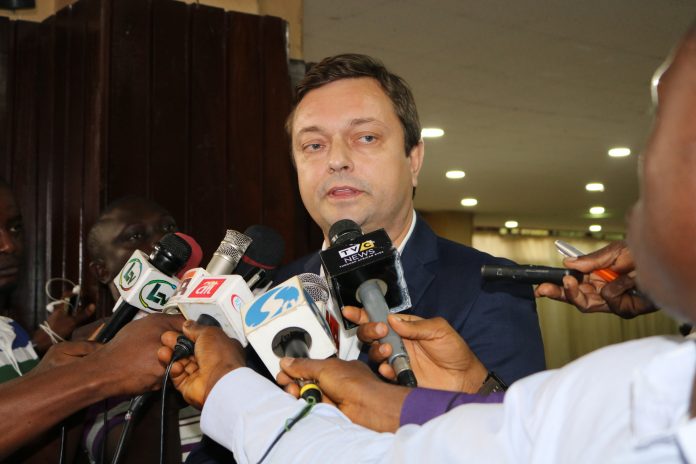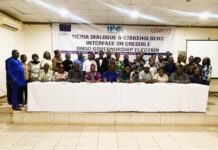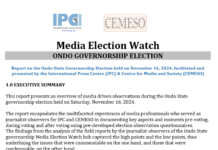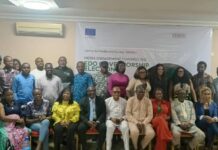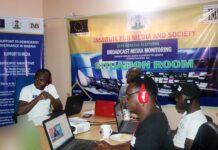To mark its 2018 Europe Day in Nigeria, the European Union (EU), in collaboration with the Independent National Electoral Commission (INEC) and other partners began a massive campaign on Nigerian university campuses, with the aim of reaching millions of Nigerian youths ahead of the 2019 elections and for future participation in politics.
Head of EU delegation to Nigeria and the Economic Community of West Africa (ECOWAS) Ketil Karlsen, speaks on EU’s commitment to strengthening democracy in the country.
Can you please give us a perspective into why EU is so interested in young people’s participation in Nigerian politics?
Following the passage of the Not-too-young-to-run bill into law, an exercise that was fully funded by the EU, we have also committed resources into mobilising young Nigerians to add value, quality and resourcefulness into the Nigerian political space. It is imperative that 60 percent of Nigeria’s population who are young people play active role in deepening and strengthening of its democratic culture. Europe is not laying any claim to perfection in its democratic practice but that out action is based on the belief that the search for value and progress in democracy never ends and democracy is an ongoing experience that must be pursued continually.
Sixty percent of the population of Nigeria are young people, so we looked that as an issue demanding attention for the European Union this year. We decided to engage young people in the democratic process leading up to the 2019 elections. That is how we started on the 9th of May, at the celebration marking Europe Day, focusing on Democratic governance.
We had the participation of a number of politicians and other stakeholders. We have been moving from one geographical zone to another with a number of celebrities you met to pass across very important and constructive messages about the importance of their participation in politics, about how important it is that they do not sell their votes, on the importance of having real political dialogue in Nigeria, about having a political system that is increasingly about substance and real solution for real problems, about not getting into power for the sake of power but about getting into power for the sake of providing real solutions.
So, what do you intend to achieve from this campaign?
Modern diplomacy is about having dialogue with people and about reaching out beyond the decision makers and other ambassadors, and engaging members of the civil society among other stakeholders. We are not coming here to preach that we have found perfection in Europe on democracy and there is nowhere in the world where the battle for values has come to an end. The fight for human rights and democracy all over the world is something the EU needs to continue to pursue. The EU had worked for the consolidation of democracy with other partners around the world and would continue to do so for many years and that is exactly what we have been doing in this outreach, addressing young people on how to make Nigeria’s democracy better. Right now, the collective reach of these celebrities on the campaign tour is up to about ten million young people. We are reaching massive audience of young people and we are also counting on the media to also spread the message. We have also been supporting YIAGA Africa, with their work on the Not-too-young-to-run campaign. The EU is also a strong supporter of the ‘Ready to Run’ campaign.
We know it would take time for the number of young people expected to occupy the political space, it is political culture that we are talking about and developing a culture takes time. What we are doing here is to reach out to our partners, members of the national assembly, the media, politicians and above all, the voters and it happens that about 60 percent of them in Nigeria are young people.
Our programme is not designed to support any particular ideology or political party, or a particular candidate that is none of our business, we don’t do that. People have speculated quite often in the media, whether the west is backing one candidate or the other, we are not into that at all; we are committed to strengthening and supporting the democratic process. That is the message we have been passing on and we are saying at the same time that the institutions are vital, that is why we are partnering with INEC, we are commending INEC for all the hard work and efforts it has invested in order to see improvements in the conduct of elections in the country.
We have also been reaching out to politicians telling them that they have a responsibility, they need to show strong leadership and you cannot do that by engaging in vote buying, intimidation, hate speech, violence and all that. We have been reaching out to voters to make them see how important it is that they should vote. We have seen consistently, since we were here in 1999, with our long term observation mission, gradual improvement even in the last elections, to the one in Osun, we have seen improvement and the re-run election where we saw matters of real concern, evidence of intimidation, interference, etc, we have also pointed it out. This demonstrates that while we have seen the conduct of INEC’s performance improving over the years, we need to be worried also that there is a possibility of a fall back.
We need to put forces together as we look forward to 2019 in order to ensure that there is yet a deepening of the process and further demonstration of steps in the right direction towards the consolidation of democracy not resting on their laurels.
From your experience since 1999, what will you say about the country’s elections, with regards to the improvements you talked about?
The challenges one see now is that, it has become more difficult to rig votes and to cheat at the polling unit but there are some bad apples that try to find way around that through intimidation, vote buying and that is something that Nigeria should look into because they affect the legitimacy of elections and it is common that anywhere there is a close race and the stakes are high, the temptation to cut corners for some is higher but it is not only at the presidential level but also at the state level, so we will keep a close eye on that.
We just had an expert mission here; we will have an exploratory mission coming in ahead of the 2019 elections. We hope to have a very significant amount of long term diplomatic watch.
What are your expectations from your campaign for young Nigerians’ participation in politics, how soon would you expect changes in the system?
We all know that having the Not-too-young-to-run was a small miracle in its own right. YAIGA and politicians that spearheaded it have demonstrated that it can be done, they have injected that hope that what many believed cannot be done are possible and that positive momentum should not be shut down but we all know that the implementation and bringing it into reality will take time and besides young people, far too few women participate in politics and that is also a concern. It takes the participation of everyone and all the solutions would not just come from EU, it takes time to build political culture, it is not going to be easy to bring all the youth on board. I met with a large crowd of young aspirants just immediately the Not-too-young-to-run bill was passed and we started the ‘Ready to Run Campaign,’ and I told them that I don’t want them to become politicians just because they are young but because they have the best ideas, the best capacity, the best offers, the best vision and if it happens the best vision comes from someone that is 100 years old, so be it.
But, what we don’t want is to exclude a big proportion of society whether they are women, whether people in certain vulnerable situations. What I have seen is that there are so many young, dynamic and incredible Nigerians, these people have to bring in their dynamism and the incredible things that they are capable of into politics, that is the spirit of having young people in the process, to have that dynamic, competent engagement you see everywhere in the country in the political space. We have seen the beginning of it and we hope to see much more in the future and if we don’t see much of it, then there would be a challenge in terms of the continued consolidation of democracy based on the belief that political system is able to provide solutions that people want to all challenges.
We have reached out to about five geographical zones in the country and reaching out to students was the right thing to do and we know that reaching to university students does not necessarily mean we have reached out to all young people, but they also have a responsibility as leaders of their generation to pass it down to their community. What we expect is a snowball effect that would reach out to various communities they are representing by deploying the social media, reaching out to politicians and other stakeholders, so this outreach by EU is an important contribution and I am proud that EU is a part of this.


